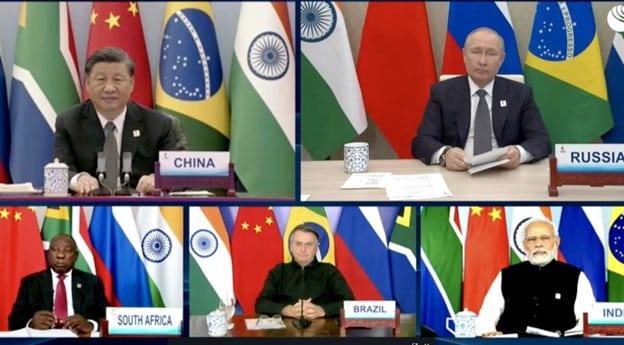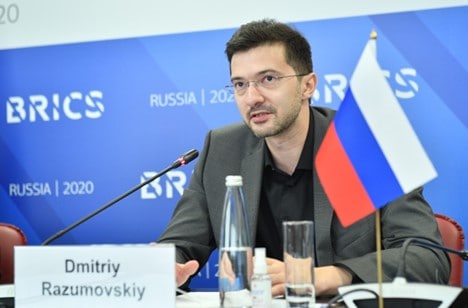The Russian leadership has tried to convince its citizens that the countries imposing sanctions upon Russia in response to the war in Ukraine do not represent the majority of the world's nations, and that most of the world does not subscribe to the sanctions policy. For this reason, Russia plays up its membership in the BRICS (Brazil, Russia, India, China and South Africa) grouping, an economic organization that includes such powerhouses as China and India, The news that Saudi Arabia, Turkey and Egypt are preparing to file applications for BRICS membership was reported under a headline "Saudi Arabia, Turkey and Egypt Want to Become Allies of Russia" in one Russian outlet. Previously there were reports that Argentina and Iran had applied to join BRICS prompting President Putin to announce that Russia has many like-minded supporters around the world. Putin called for a common BRICS response to Western threats. [1]
Russian presidential aide, Yuri Ushakov claimed that Russia is positive about a potential BRICS enlargement and would like to accelerate work on procedures and requirements governing the acceptance process to the organization. Russian Foreign Minister, Sergei Lavrov called Argentina and Iran worthy candidates for BRICS membership[2]. Despite the general enthusiasm and the endorsement of the proposition that Russia would not be isolated economically, it was possible to detect different approaches among commentators on key questions: How rapidly should the organization grow and should it abandon its current structure based on leading regional countries? Additionally, how should the organization interact with existing trading blocs, and whether it should take a pointed political stance against the West?
A report on Russia's attitudes towards BRICS' expansion follows below:

Leaders of the BRICS country in their June, 2022 summit via videoconference (Source: Katehon.com)
Some Russian commentators took a the more the merrier attitude. Political scientist Alexander Asafov believed that Africa in its entirety could join in the near future and the enthusiasm was not limited to Africa. The aforementioned candidates could be followed by Syria, Indonesia, Nigeria, Bangladesh, Tajikistan, Thailand, Greece and Mexico. If we say that “more than half the world wants to join the BRICS, we will not be far from the truth,” Asafov optimistically proclaimed. He added that a powerful economic bloc could serve as a base for a future military-political platform.[3]
Yaroslav Lisovolik, a member of the Russian International Affairs Council and the Valdai Discussion Club think tank urged the BRICS countries to develop acceptance criteria for new members but felt that the organization's further expansion would strengthen its position in the international arena and the global economy. He also took the view that "It is important not only for the country to join the core of BRICS members, but also that state's regional partners."[4]

Dmitry Lisovolik (Source: Ria.ru)
In contrast an article by Yevgeny Ivanov in Nakanune.ru, was more cautious both in terms of expansion and the goals of the organization. Ivanov advocated favoring states that were both regional economic leaders and civilizational states.
"One possible criterion for admission to the ranks of the association may be the state's economic leadership state in its region. Egypt and Turkey meet these criteria, moreover, Egypt is already a member of the New Development Bank, created by the organization as an alternative to the World Bank. In any case, other countries may also meet the criteria, the main condition is that they do not contradict the general directions of development and initiatives of the BRICS."
Ivanov noted that accentuating the anti-Western orientation of the grouping could lead to problems " Undoubtedly, the association is being built as an economic alternative to the dictates of the United States and its partners, but will this desire alone suffice for development? Unfortunately, it cannot be stated with certainty that BRICS has been developing without internal problems all this time. So, after taking office as Brazilian President Jair Bolsonaro in 2019, the politician said that the United States is their main ally and guide, both in domestic and foreign policy. And this means that the confrontation with China and Russia can only grow... conflicts between India and China have been going on for several years, rattling off border skirmishes and disputed territories. And to this we can add potential contradictions between Iran, Turkey and Saudi Arabia for influence in the Middle East. Against this background, the unified imposition of sanctions against Russia by the countries of the united West makes one wonder if such a unity in the BRICS is possible on any issue?"
SUPPORT OUR WORK

Attempts to turn BRICS into an anti-American bloc were self-defeating and also contradicted Russia's advocacy of a multipolar world, in which states can act independently. " So what unites the BRICS? If this is "anti-Americanism", an attempt to oppose one's own resources to the resources of the other camp, then, as is known, associations and, in general, any ideas built on the "anti" principle cannot exist indefinitely."
Russia could content itself with the issues on which consensus existed because that would advance Russia's interests: "The largest BRICS countries are civilization states with a unique history and culture. In practical terms, all participants are striving for a more equitable organization of world trade and do not accept the practice of sanctions. There are also concrete plans in this direction: the transition to settlements in national currencies and the creation of an alternative reserve currency to the dollar.
"Yes, countries are different, there may be disagreements between them. But now the priorities are being updated and the old contradictions may fade into the background. A major advantage of BRICS is that this economic bloc has a positive agenda. It is focused on problem solving and cooperation, and does not aim to enforce the will and interests of one actor."[5]
Dmitriy Razumovskiy, director of the Russian Academy of Sciences' Institute of Latin America believes that BRICS has an opportunity to reinvent itself given the fundamental transformation of the globalization process. BRICS was a no-show during the Covid crisis and the countries can no longer pretend to be a growth powerhouse as Brazil, South Africa and Russia have contended with stagnating growth. Like Ivanov, Razumovskiy believes that the organization should focus on pragmatic, technocratic areas. This helped the organization weather the Jair Bolsonaro era in Brazil and its pro-American direction, it also improved the quality of the decisions.
As for expansion, the regional leader criterion may need modification, but current members may be reluctant to share the regional limelight with newcomers.
" Expansion through the inclusion of new full members has been discussed since the first years of the functioning of the BRICS. Since the concept of BRICS as an alliance of civilizations initially prevailed, where each macro-region is represented by one leader, the inclusion of a large Islamic country was most likely. Indonesia, as the world's largest Islamic country in terms of population, and Egypt were usually considered. The recent application for the entry of Shiite Iran changes this logic, since, apparently, when inviting Tehran to the recent 14th BRICS summit, China was guided by the exceptional importance of the country precisely from the point of view of its energy potential as one of the leaders in terms of hydrocarbon reserves.
"The possibility of Argentina joining the BRICS was also discussed for a long time, but Brazil was interested in maintaining its role as a regional leader, representative of all of Latin America. The possibility of competition from Buenos Aires did not arouse enthusiasm among the authorities of the tropical giant, even during the reign of the left, despite the friendly relations of the countries at that time. Argentina then did not yet face the economic problems that it is experiencing today, the country's economy was one of the most dynamic in the region.
Therefore, the expansion process could take several years until the consent of all participants was secured.
Razumovskiy recommends that Russia should follow the flexible Chinese approach and work on various tracks and not attempt to accelerate the integration process of BRICS with organizations such as the Eurasian Economic Union where Russia is dominant. This can fall afoul of protectionist tendencies within the various trading blocs.
Razumovskiy seconds Ivanov's position that pressing BRICS into an overt anti-American stance could backfire and therefore Russia should content itself with what is possible:
"For Russia, such a transformation and expansion (geographical and thematic) of the BRICS is obviously beneficial. The intensification of work on the creation of independent financial mechanisms (a new international currency, a pool of reserve currencies, the BRICS Pay payment system) is of interest not only to Moscow, which seeks to reduce its dependence on the monetary infrastructure of the West. The possible inclusion of new members, Argentina and Iran, demonstrates the failure of the policy to isolate Russia. The Kremlin is ready to move away from the previous logic of BRICS, when the association was emphatically positioned neither as an alternative to the West, nor as a coalition against it. Today, such positioning is no longer relevant for Russia and China. The latter confirmed this by inviting Iran, a country in long-standing conflict with the United States, but holding almost 9 percent of the world's oil reserves and 17 percent of natural gas, to participate in the summit.
"However, such an anti-Western projection of the BRICS is not beneficial to all its participants. Significantly, India, as well as candidate Argentina, took part in the G7 summit. Argentina depends on the position of the IMF because of its debt problem, and discusses the possibility of obtaining assistance from developed countries. India seeks to pursue a multi-directional policy by participating with the US, Japan and Australia in the Quadripartite Security Dialogue (QUAD). The interest in achieving the common goals of improving global regulation and interaction for the sake of development does not mean that all BRICS members are ready to oppose themselves to the countries of the West. Realizing the positive from the emerging new period of growth of the association, all countries need to remain diplomatic in advancing their priorities, groping for a delicate balance that will give the BRICS the required stability in the next development cycle."[6]

Dmitriy Razumovskiy (Source: Brics.russia2020.ru)




